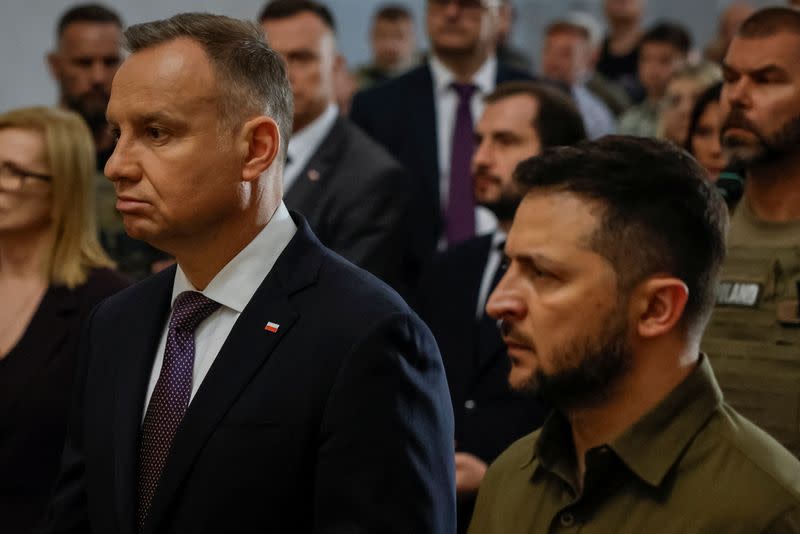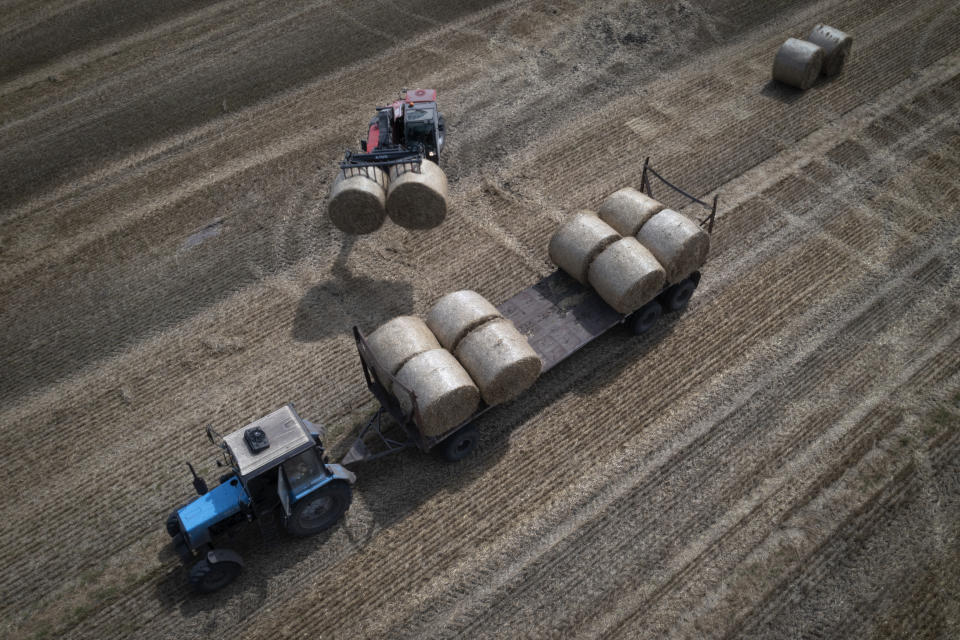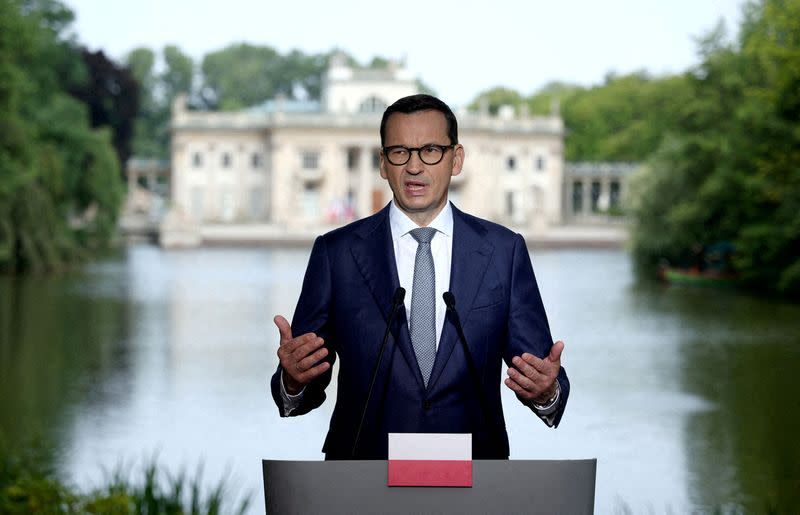Poland's prime minister told Ukrainian President Volodymyr Zelenskiy on Friday not to "insult" Poles, maintaining harsh rhetoric towards Kyiv after the Polish president had sought to defuse a simmering row over grain imports.
Poland decided last week to extend a ban on Ukrainian grain imports, shaking Kyiv's relationship with a neighbour that has been seen as one of its staunchest allies since Russia invaded Ukraine in February last year.
Zelenskiy angered his neighbours when he told the United Nations General Assembly in New York that Kyiv was working to preserve land routes for grain exports, but that the "political theatre" around grain imports was only helping Moscow.
"I... want to tell President Zelenskiy never to insult Poles again, as he did recently during his speech at the U.N.," Prime Minister Mateusz Morawiecki told an election rally.
Poland holds a parliamentary election on Oct. 15, and Morawiecki's ruling nationalist Law and Justice (PiS) party has come in for criticism from the far right for what it says is the government's subservient attitude to Ukraine.
Analysts say this has forced PiS, which looks set to remain the biggest party but may not secure a majority, to adopt a more confrontational approach to Kyiv in the closely fought campaign.
Earlier on Friday, President Andrzej Duda, a PiS ally, had said the dispute between Poland and Ukraine over grain imports would not significantly affect good bilateral relations, in an apparent move to ease tensions.
"I have no doubt that the dispute over the supply of grain from Ukraine to the Polish market is an absolute fragment of the entire Polish-Ukrainian relations," Duda told a business conference.
"I don't believe that it can have a significant impact on them, so we need to solve this matter between us."
BACKING UKRAINE
Meanwhile, in an article for Politico, Polish Foreign Minister Zbigniew Rau said Poland wanted to see "a strong Ukrainian state emerge from this war with a vibrant economy" and that Warsaw "will continue to back Ukraine's efforts to join NATO and the EU".
"There's absolutely no contradiction here." Rau wrote. "Supporting Ukraine against Russia's invasion and protecting our citizens and safeguarding them against unfair economic competition — both serve Poland's interest simultaneously."
However, speaking to reporters in New York, Rau said that while Poland had not changed its policy towards Ukraine, there had been a "radical change in Polish public opinion's perception" of the countries' relations.
Asked by state-run news agency PAP what it would take to improve this perception, Rau said repairing the atmosphere would require a "titanic" diplomatic effort.
Slovakia, Poland and Hungary imposed national restrictions on Ukrainian grain imports after the European Union executive decided not to extend its ban on imports into those countries and fellow EU members Bulgaria and Romania.
The countries have argued that cheap Ukrainian agricultural goods - meant mainly to transit further west and to ports - get sold locally, harming their own farmers.
The EU, which imposed its ban in May, let it expire on Friday after Ukraine vowed to tighten controls.
Morawiecki said on Friday Warsaw would take matters into its own hands again if it saw a need.
"If there is destabilisation of other markets... and the European Commission doesn't act we will again take unilateral action on our side," he said. "In defence of the Polish farmer I will never hesitate to take such a decision."
Grain spat drags Ukraine's ties with ally Poland to lowest point since start of Russian invasion.
A dispute about whether Ukrainian grain should be allowed to enter the domestic markets of Poland and other European Union countries has pushed the tight relationship between Kyiv and Warsaw to its lowest point since Russia invaded Ukraine last year.
Polish leaders have compared Ukraine to a drowning person hurting his helper and threatened to expand a ban on food products from the war-torn country. Meanwhile, Ukrainian President Volodymyr Zelenskyy suggested that EU allies that are prohibiting imports of his nation’s grain are helping Russia.
Poland, on NATO’s eastern flank, has been a staunch supporter of Ukraine, sending weapons and humanitarian aid and opening its borders to refugees.
Now, Polish officials, who are trying to win parliamentary elections next month with help from farmers' votes, are expressing dismay over some of Ukraine's latest moves, including a World Trade Organization complaint over bans on Ukrainian grain from Poland and two other EU countries.
“Alarmingly, some in Europe play out solidarity in a political theater — turning grain into a thriller. They may seem to play their own roles. In fact, they’re helping set the stage for a Moscow actor,” Zelenskyy said Tuesday during the U.N. General Assembly.
Poland’s deputy foreign minister, Pawel Jablonski, on Wednesday voiced “strong protest” of Zelenskyy's comments to Ukrainian Ambassador Vasyl Zvarych.
Jablonski “indicated that it is untrue, as far as Poland is concerned, and that the opinion is unjustified toward the country that has been supporting Ukraine from the very first days of the war,” the Polish Foreign Ministry said in a statement.
Tadeusz Iwanski, a Ukraine analyst from a Polish state-funded think tank, said that since the beginning of the war, Ukraine “has been pursuing a hyperassertive diplomacy, partly due to which its requests and demands have been granted, and it has been proven effective.”
“This assertive policy might have taught Ukraine that things can be achieved through such diplomacy,” said Iwanski, head of Belarus, Ukraine and Moldova studies at the Centre for Eastern Studies in Warsaw.
He said Ukraine likely feels strong pressure to export its grain to help bolster its finances.
Some other analysts in Poland faulted the Warsaw government, accusing it of playing politics with Ukraine’s security to win votes.
Poland's ruling Law and Justice party is fighting for the votes of farmers, many of whom are upset that Ukraine's food products have flooded the local market, pushing prices down and hurting their livelihoods.
Poland, Hungary, Slovakia and Croatia banned some Ukrainian agricultural goods after the EU recently decided to lift such restrictions. Croatia joined in Tuesday, when Kyiv announced it was responding with a WTO complaint.
“Ukraine is behaving like a drowning person clinging to everything he can ... but we have the right to defend ourselves against harm being done to us,” Polish President Andrzej Duda told reporters Tuesday in New York, where he was attending the U.N. General Assembly.
The growing tensions highlight the risks Ukraine faces in maintaining Western support as its fight against Russia drags on.
Ukraine prevailing is so important to Poland that it would not be likely to restrict the military assistance to Ukraine. Poland has bitter memories of being subjected to Moscow's rule in the past and does not want to see Russia win a war in a neighboring country.
Poland's ruling party faces an election challenge from a new far-right coalition, Confederation, whose leaders complain that the country is doing too much to help Ukraine and claim Ukraine isn’t grateful enough.
The rift also shows how Ukraine and its neighbors are competing agricultural powers and how European defense of domestic farmers could complicate Kyiv's hopes for a future path into the EU.
Ukraine — a major global supplier of wheat, barley, corn and vegetable oil — has struggled since Russia’s invasion to get its food products to parts of the world struggling with hunger. All the EU countries will keep allowing Ukrainian products to move through their borders to world markets.
Russia dealt a huge blow by withdrawing in July from a wartime agreement that ensured safe passage for Ukrainian grain through the Black Sea. That has left more expensive routes through Europe as the main way for Ukraine to get its products to developing nations where food prices have risen since Russia's war began.
However, the first ship loaded with grain left a Ukrainian port this week under a temporary Black Sea corridor.
Ukraine also threatened this week to ban some Polish food items, but appeared to back off that. Such a move would bring only more bans from Poland, Prime Minister Mateusz Morawiecki said.
“I am warning the Ukrainian authorities, because if they escalate the conflict in this way, we will add more products to the ban on imports into Poland,” Morawiecki said Wednesday on Polsat News.
He argued that Ukrainian officials do not seem to understand how Poland's agricultural market has been destabilized by the war.
In Bulgaria, the pro-Russia Socialist party has submitted a proposal to parliament to ban foods from Ukraine. So far, the government is just halting the import of sunflower seeds until a quota is agreed with Kyiv.
Prime Minister Nikolai Denkov announced the measure late Tuesday after lengthy talks with farmers who launched a nationwide protest last week over parliament's decision to lift a ban on Ukrainian imports, citing higher food prices.
Poland, with election looming, says it isn't sending new arms to Ukraine.
Poland is only carrying out previously agreed arms deliveries to Ukraine, a government spokesman said on Thursday, amid souring bilateral relations due to a grain dispute just weeks before a Polish parliamentary election.
Poland's decision to extend a ban on Ukrainian grain imports has annoyed Kyiv. Poland has been seen until recently as one of Ukraine's staunchest allies in its war with Russia.
Prime Minister Mateusz Morawiecki said on Wednesday that Poland, a NATO member, was no longer arming Ukraine and was focusing on rebuilding its own weapon stocks.
"I would like to inform you that Poland is only carrying out previously agreed supplies of ammunition and armaments," government spokesman Piotr Muller told state-run news agency PAP on Thursday. "This includes those resulting from the contracts signed with Ukraine."
Asked about Morawiecki's comments on arms supplies, State Assets Minister Jacek Sasin said: "At the moment it is as the prime minister said, in the future we will see."
Sasin said the row over grain imports did not mean Poland had ceased to back Ukraine against Russia but that Warsaw needed to replenish its own arms stockpiles.
"In this case, Polish interests come first," he said. "We cannot disarm the Polish army, we cannot get rid of the weapons that are necessary for our security."
"Where we could arrange for the transfer of weapons, we did it and we were very generous in this matter... here we have absolutely nothing to reproach ourselves with."
Poland has supplied, among other weapons, T-72 and Leopard tanks, armoured vehicles and howitzers to Ukraine since the Russian invasion on Feb. 24, 2022. Warsaw has not published a complete list of all the material it has given.
Ukraine's ambassador to Poland moved to ease tensions, telling PAP that "there is no person in Ukraine who would be interested in creating any problems for Polish farmers", adding that he thought an accord on the grain issue could be reached.
Ukraine's farm minister, in a phone call with his Polish counterpart, agreed to work out a solution to the grain dispute that is in the interests of both countries, the Ukrainian agriculture ministry said.
'MOMENTS OF TENSION'
A U.S. official who recently visited Poland dismissed suggestions that Morawiecki's comments on arms supplies were a sign of cracks in Western solidarity with Ukraine.
"We're all human and there are moments of tension... But that doesn't mean that there's going to be some dramatic shift in alliance unity or even Poland's fundamental position and determination to support Ukraine for as long as it takes," said the official, who spoke on condition of anonymity.
Poland holds a parliamentary election on Oct. 15, and the ruling nationalist Law and Justice (PiS) party has come in for criticism from the far right for what it says is the government's subservient attitude to Ukraine.
The Confederation party, which has given voice to anti-Ukrainian sentiments, is third in many polls and has emerged as a possible kingmaker. Analysts say PiS's tougher rhetoric on Ukraine is a response to Confederation's increasing popularity
Marek Swierczynski, a defence analyst at think-tank Polityka Insight said that while it was probably true that Poland currently had no more weapons to give to Ukraine, Morawiecki must have known that the timing of his comments meant they would land "like a grenade into a cesspit".
"In my opinion it is more of an escalation of the campaign... to gain a few percent more of the anti-Ukrainian electorate in Poland," he said.





